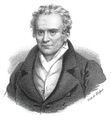Template:Selected anniversaries/July 28: Difference between revisions
No edit summary |
No edit summary |
||
| Line 6: | Line 6: | ||
File:Gaspard Monge.jpg|link=Gaspard Monge (nonfiction)|1818: Mathematician and engineer [[Gaspard Monge (nonfiction)|Gaspard Monge]] dies. He invented descriptive geometry, and did pioneering work in differential geometry. | File:Gaspard Monge.jpg|link=Gaspard Monge (nonfiction)|1818: Mathematician and engineer [[Gaspard Monge (nonfiction)|Gaspard Monge]] dies. He invented descriptive geometry, and did pioneering work in differential geometry. | ||
||John Gough (d. 28 July 1825) was a blind English natural and experimental philosopher who is known for his own investigations as well as the influence he had on both John Dalton and William Whewell. | |||
||1874 – Ernst Cassirer, Polish-American philosopher and academic (d. 1945) | ||1874 – Ernst Cassirer, Polish-American philosopher and academic (d. 1945) | ||
Revision as of 20:14, 27 November 2017
1818: Mathematician and engineer Gaspard Monge dies. He invented descriptive geometry, and did pioneering work in differential geometry.
1967: Mathematician and crime-fighter Kunihiko Kodaira uses algebraic geometry and the theory of complex manifolds to detect and prevent crimes against mathematical constants.
1968: Chemist and academic Otto Hahn dies. He pioneered the fields of radioactivity and radiochemistry, winning the Nobel Prize in Chemistry in 1944 for the discovery and the radiochemical proof of nuclear fission.
1974: Watergate scandal: The House of Representatives Judiciary Committee votes 27 to 11 to recommend the first article of impeachment (for obstruction of justice) against President Richard Nixon.
1974: Industrialist, public motivational speaker, and alleged crime boss Baron Zersetzung says he "advised President Nixon to have one of the House Judiciary Committee members murdered, as a lesson to the others."




